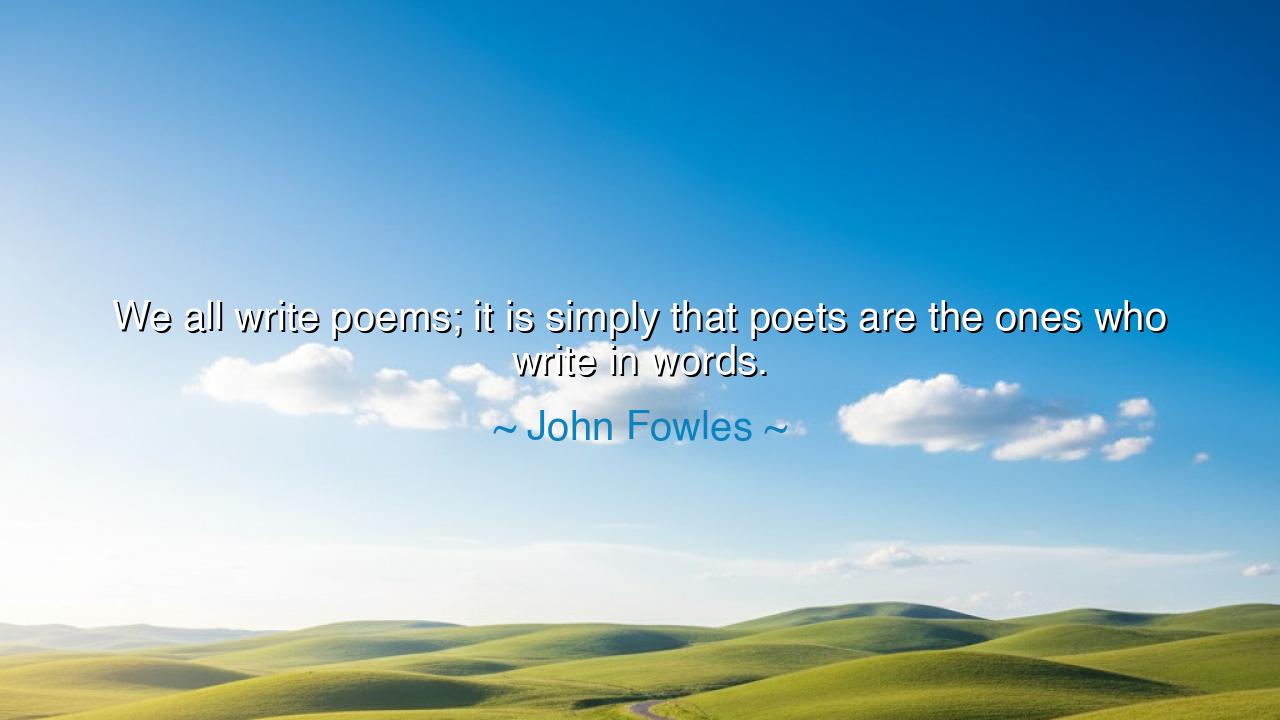
We all write poems; it is simply that poets are the ones who






In the luminous words of John Fowles, “We all write poems; it is simply that poets are the ones who write in words.” This statement shines like a mirror held up to humanity, for it suggests that poetry is not confined to the printed page, nor to the hands of a chosen few. Rather, poetry is the deep rhythm of human life itself, expressed through our actions, our loves, our sacrifices, and our dreams. The poet simply makes this hidden music visible in words, while the rest of us compose our verses in silence, through the shape of our days.
What does it mean to say we all write poems? It means that every gesture, every act of kindness, every sorrow endured, is a stanza in the unwritten epic of existence. The farmer at dawn who bends over his fields, the mother who sings to her child in the dark, the soldier who lays down his life for his people—all of them are composing living poetry. Their lines are not ink upon paper, but deeds upon the fabric of the world. Fowles’ wisdom declares that poetry is not the privilege of the writer but the inheritance of every soul.
The poet, however, takes on the sacred labor of capturing this music in language. He listens more closely, observes more deeply, and sets down in words what others live but cannot fully express. Thus Homer sang of the rage of Achilles, not because rage belonged to Achilles alone, but because anger, grief, and longing belong to us all. The poet translates life into verse so that the common experiences of humanity might be remembered, honored, and shared across time.
History provides luminous examples. Think of Anna Akhmatova, who lived under Stalin’s shadow. While her people endured fear and silence, she wove their grief into words, giving voice to what they carried in silence. The people had already written their poetry in suffering and survival; Akhmatova simply gave those unwritten stanzas a language. In her verses, their unspoken pain became eternal song. Here we see the heart of Fowles’ meaning: the poet is not separate from humanity but its interpreter, the one who gathers the unwritten poems of daily life and casts them into the fire of words.
The deeper truth in Fowles’ statement is also humbling. It suggests that none are without poetry, even if they never write a line. The artist who paints, the lover who whispers, the child who dreams—all participate in this universal act of creation. Poetry is not only meter and rhyme; it is the shaping of beauty and meaning out of chaos. We all partake in it, whether through language, through music, through work, or through living itself. The difference is only in the medium.
The lesson for us, then, is to live more consciously as poets of our own lives. If all that we do is a kind of poem, then let our stanzas be worthy. Let our actions be verses of kindness, our choices lines of courage, our struggles rhythms of perseverance. And if we feel compelled to shape them into words, let us do so with care and reverence, knowing that in writing we serve not only ourselves, but the great poem of humanity.
Practically, this means pausing in our daily lives to recognize the poetry already present. Notice the sunrise as a metaphor for hope. See in the wrinkles of the old the lines of an epic long written. Share your own experiences in speech or writing, not to boast, but to contribute to the chorus of human expression. For whether or not you call yourself a poet, you are always writing—a poem with your life, a poem that will outlast you.
Thus, John Fowles’ words endure as both revelation and charge: “We all write poems; it is simply that poets are the ones who write in words.” Live as though your every act were a line of verse, and honor those who record such lines in language. For together, we are authors of the greatest poem of all—the unfolding of the human story across the ages.






AAdministratorAdministrator
Welcome, honored guests. Please leave a comment, we will respond soon